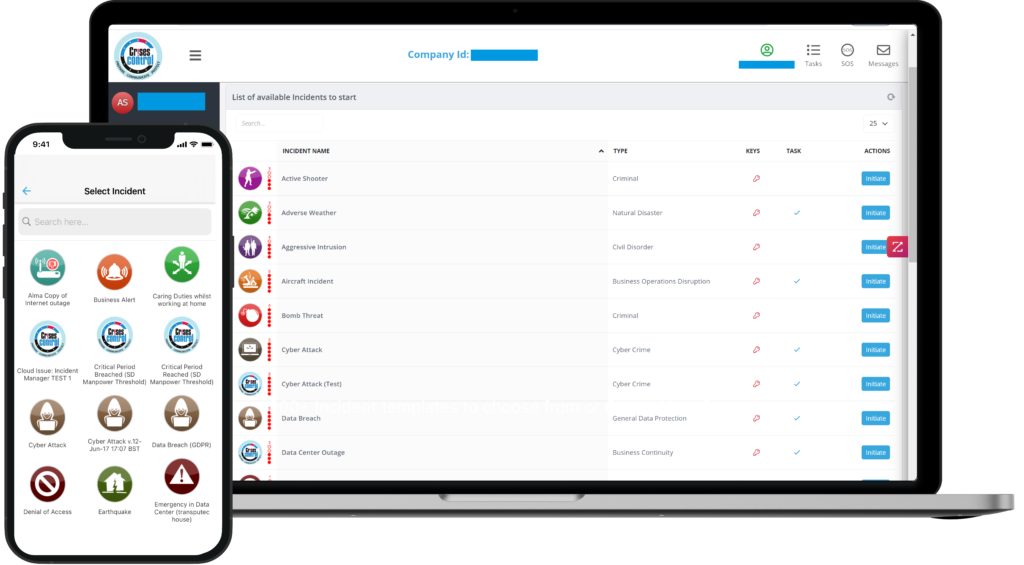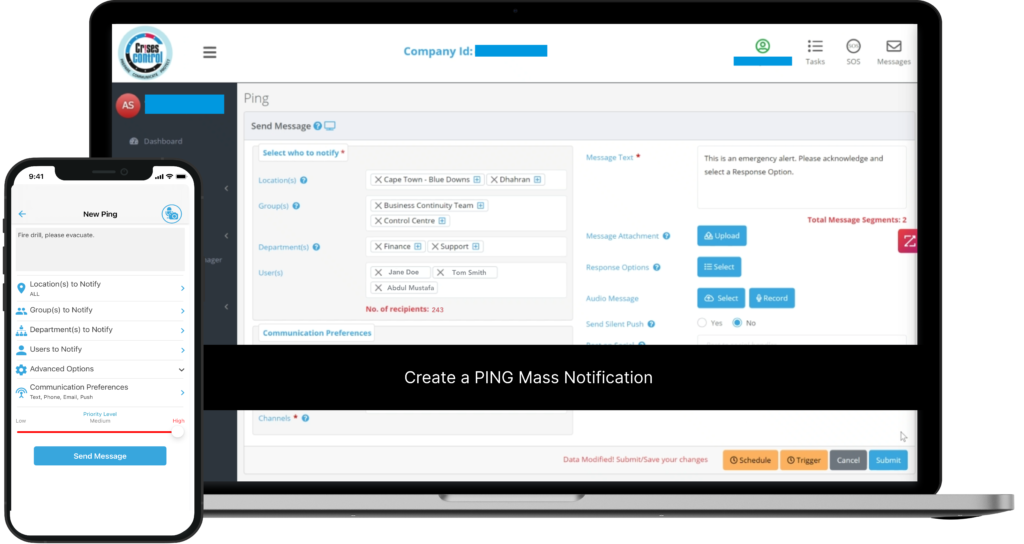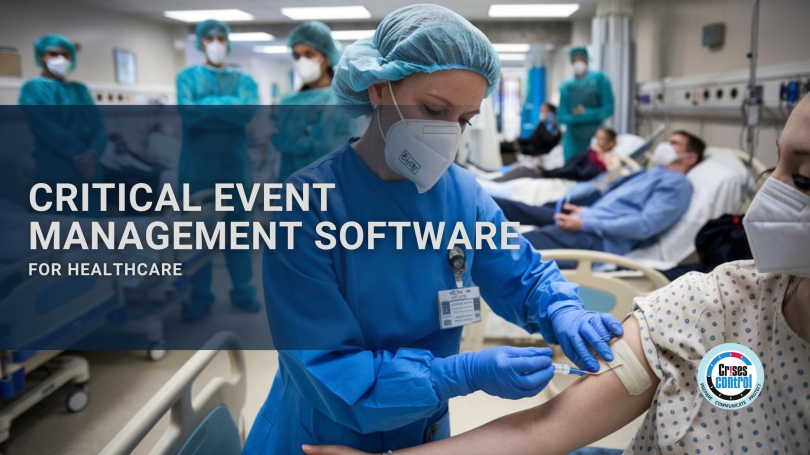Written by Anneri Fourie | Marketing Executive
In healthcare, every second is crucial during an emergency. Whether it’s a natural disaster, power outage, or a cyberattack, hospitals and healthcare facilities face enormous pressure to maintain seamless operations and ensure patient safety. Emergency preparedness in hospitals requires more than just good planning—it demands swift, organised, and reliable action. This is where Critical Event Management Software becomes indispensable.
This blog will explore how Critical Event Management Software can revolutionise hospital emergency response systems, allowing healthcare organisations to stay ahead during critical situations. We will dive into practical benefits like real-time communication, task management, and mass notifications, and show how Crises Control offers healthcare facilities the robust tools they need to respond quickly and effectively.
The Unique Challenges Hospitals Face in Emergency Response
Hospitals operate under high stakes every day, with complex systems that require coordination between various departments and teams. When emergencies strike, the pressure to maintain operations while ensuring the safety of patients and staff multiplies. From pandemics to power failures, hospitals must be equipped to handle any crisis, but they face several unique challenges in doing so:
1. Delayed Communication
In an emergency, notifying the right people quickly and accurately is essential. Yet, many hospitals still rely on outdated systems such as phone trees or mass emails, which are too slow and unreliable during time-sensitive crises. Without a clear, centralised communication platform, delays in relaying critical information can lead to confusion and missed opportunities for action.
2. Lack of Real-Time Information
Hospitals must make decisions on the fly, but without real-time data, leadership may not have a clear understanding of the situation as it unfolds. Without up-to-date information, resources may be misallocated, or response efforts may fall short, compromising both patient care and staff safety.
3. Coordination Between Teams
Hospitals house various departments, each playing a critical role during emergencies. However, coordinating teams such as medical staff, IT, facilities management, and security in real time can be a logistical nightmare. The lack of visibility into what each team is doing, or should be doing, makes it difficult to execute emergency plans efficiently.
These challenges underline the importance of having a robust, integrated system that facilitates communication, provides real-time updates, and coordinates tasks across departments. That’s where Critical Event Management Software steps in.
How Critical Event Management Software Streamlines Emergency Response in Healthcare
Critical Event Management Software (CEMS) is designed to address the core problems hospitals face in managing emergencies. This software integrates real-time communication, automated task management, and centralised control, ensuring hospitals can respond swiftly and efficiently during crises. Let’s break down how it works.
1. Centralised Communication for Rapid Response
Communication is the cornerstone of any emergency response. Critical Event Management Software centralises all communication channels—SMS, email, voice calls, and mobile app notifications—into a single platform. This ensures that hospitals can send mass notifications or targeted messages to the right people in seconds, not minutes.
- Instant Mass Notifications: When a critical event happens, whether it’s a cyberattack or a system outage, hospitals need to notify staff immediately. Critical Event Management Software enables hospitals to send mass notifications instantly, informing hundreds or thousands of employees in just a few clicks. There’s no need to manually call or email staff, which could waste precious time.
- Targeted Messaging: Not all staff need the same level of information during an emergency. Doctors, nurses, IT staff, and facilities management may all require different instructions. Critical Event Management Software allows for targeted messaging so that each team receives the information relevant to their role.
For example, Crises Control’s Ping Mass Notification System empowers hospitals to send out real-time, multi-channel notifications that reach staff on any device, ensuring no one is left uninformed, regardless of their location.
2. Task Management and Coordination in Real Time
Coordination is often one of the biggest hurdles during a hospital emergency. With so many departments involved, task management can become chaotic without the right system in place. Critical Event Management Software simplifies this by automating task assignments and tracking progress in real time.
- Automated Task Assignment: When an emergency response plan is activated, the software automatically assigns predefined tasks to the appropriate teams. For instance, if there’s a power outage, the facilities team may be tasked with checking the generators, while the IT team focuses on safeguarding electronic medical records.
- Tracking and Accountability: The software provides real-time visibility into task progress, ensuring nothing is overlooked. Hospital managers can monitor the completion of critical tasks and reassign resources if needed, all within the same platform.
With Crises Control’s Incident Manager and Task Manager features, hospitals can automate workflows, eliminating the need for repeated communication between departments. Teams know exactly what they need to do, and progress can be tracked and adjusted in real time.
3. Real-Time Alerts and Dynamic Monitoring
Emergencies are fluid situations. As new information emerges, hospitals need to adapt quickly. Critical Event Management Software provides real-time dashboards that display the progression of the event and the status of the response efforts, helping hospital leaders make informed decisions on the go.
- Dynamic Monitoring: The software continuously tracks the status of the crisis and sends out situation-based alerts when changes occur. For instance, if a system restoration is delayed, the software can alert IT and facilities management to adjust their priorities.
- Real-Time Decision Support: By providing real-time data, the software enables hospital administrators to pivot their response strategies as the situation evolves. Leaders have full visibility into what’s happening, who is handling it, and whether more resources are needed.
Crises Control’s platform ensures that hospitals have the tools they need to monitor crises in real time, make swift decisions, and keep teams informed as new developments arise.

Interested in our Incident Management Software?
Customise your Crisis Incident Management Software to meet your specific needs with our flexible tools & stay connected and informed during the crisis and incident management process
How Crises Control Can Help Transform Hospital Emergency Response
Crises Control offers a comprehensive range of tools that streamline hospital emergency response:
- Mass Notification System: Instantly notify staff across multiple channels—SMS, email, voice, and mobile app—ensuring the message reaches everyone quickly and efficiently.
- Incident Manager and Task Manager: Automate task assignments, track progress in real time, and ensure accountability.
- Real-Time Alerts: Receive dynamic alerts based on the progression of the crisis, allowing hospital management to make quick decisions.
- Mobile Access: Crises Control’s mobile app allows staff to receive notifications, access information, and respond to emergencies even when off-site.
By integrating Crises Control’s tools into your hospital’s emergency plans, you can ensure that when a critical event occurs, your response is timely, coordinated, and effective, safeguarding both patients and staff.
Interested in our Ping Mass Notification Software?
Efficiently alert everyone in seconds at scale with our Mass Notification System – PING, get the message out fast and ensure rapid response and recovery.

Conclusion: Future-Proof Your Hospital’s Emergency Response
Hospitals face a growing number of threats, from natural disasters to cyberattacks. In a world where every second counts, having the right tools in place is essential. Critical Event Management Software offers hospitals the ability to streamline communication, automate tasks, and monitor situations in real time, ensuring they can respond effectively to any crisis.
If your hospital is ready to upgrade its emergency response system, Crises Control can help. Contact us for a free personalised demo to learn how our platform can enhance your hospital’s crisis management capabilities and keep your operations running smoothly when it matters most.
Request a FREE Demo

